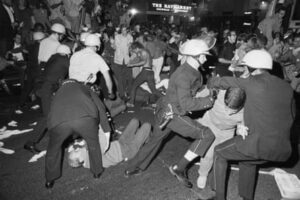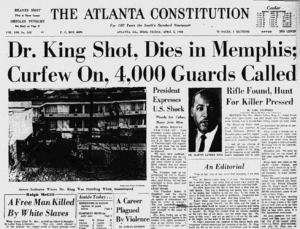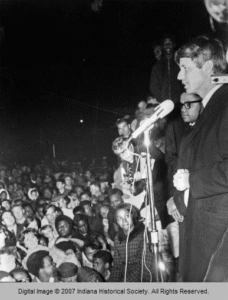To read today’s post and hear the recording, please go to the Just A Thought website. Please click here.
For Americans, and perhaps many others, it is easy to get swept away by what’s been happening in the news these days. It’s as though a giant tsunami has swept over us.
We have endured any number of tsunamis in our history.
- 1776
- 1861
- 1929
- 1941
Somehow we’ve always found a way through. Leaders emerged, the country rallied and the people chose sacrifice over selfishness.
A new day dawned.
Will the same be said of this generation?
I distinctly remember the last time this question was asked.
The year was 1968.
In January came the Tet offensive, a massive surprise attack by North Vietnamese and Viet Cong forces that shattered U.S. confidence in the Vietnam War.
Then on April 4th the assassination of Martin Luther King, Jr. in Memphis sparked grief, outrage, and riots in more than 100 American cities.
Then in June Robert F. Kennedy was assassinated, the one presidential candidate who carried hope for healing and reform.
Finally, in August, came the protests at the Democratic National Convention in Chicago, erupting in violent clashes between antiwar demonstrators and police, televised nationwide.
The events of April 4th are still a vivid memory for me.
I had just returned from lunch when I ran into my friend Greg Alex at the Newman Center on campus at the University of Washington.
He was in tears.
I asked him what was the matter? He said Martin Luther King, Jr. had been assassinated.
I’ll never forget his look of utter despondency.
That evening I watched the news with live coverage of a Robert Kennedy presidential rally in Indianapolis. Kennedy had just announced he was running for president.
He climbed onto the back of a flatbed truck, his face drawn. With no teleprompter, no script, he leaned into the microphone and said:
Martin Luther King has been shot and killed.
You could hear gasps, cries, and shouts from the audience. For a moment, you could sense the fear and rage in the air.
Kennedy paused, then spoke not as a politician, but just as a grieving man.
He reminded the mostly Black audience that he, too, had lost a brother to violence. His voice cracked as he spoke of sorrow, of the temptation toward bitterness, of the need for love instead of division.
The crowd fell quiet, listening. Some wept. Some bowed their heads. But unlike a hundred other cities there were no riots in Indianapolis that night.
For a few fragile minutes, Kennedy’s grief and theirs became one — and that unity held.

But the events of that year fundamentally changed America.
- The Tet Offensive had stripped away illusions of victory in Vietnam.
- King’s assassination exposed the deep wounds in the Black community.
- Robert Kennedy’s death stole a voice of compassion and hope.
And the chaos of the convention revealed the rupture within an entire generation.
What had once felt solid was unraveling.
The trust in government gave way to suspicion. The faith in nonviolence yielded to flames in the streets. The promise of unity fractured under the weight of war and division.
In the breaking of the trust, the faith and the promise of America lost its innocence and we came to the stark realization:
- democracy was fragile,
- justice was unfinished,
- peace was never guaranteed.
The direction of my own life was changed that year.
The tsunami I experienced carried me into a life I otherwise would not have had.
And I wasn’t alone — so many in my generations were irrevocably changed as America felt unmoored.
We are now living through a tsunami that has not yet run its course. It’s too soon to fully assess the damage, so we are left to swallow hard and remember Carl Jung’s observation:
“We cannot change anything until we accept it.
Condemnation does not liberate, it oppresses.”
History will look back on this year and judge the age by how people did — or did not — respond to the moment. The quote from Aeschylus Robert Kennedy offered up on the cold night in April 1968 has never been more relevant:
“Even in our sleep, pain which cannot forget falls drop by drop upon the heart, until, in our own despair, against our will, comes wisdom through the awful grace of God.”
Just a thought…
*****
Listen again to RFK’s message on April 4, 1968:
Just a Thought,
Pat





